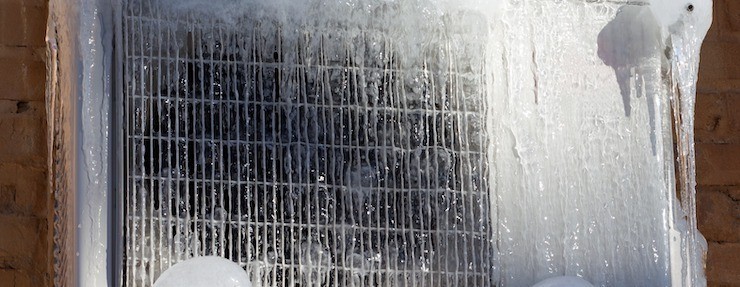Air conditioners freeze when they’re overused. When refrigerant temperatures inside your air conditioner fall below 32 degrees then the humidity on the evaporator coils freezes. These coils become covered in ice which means the air conditioner can’t cool your home efficiently.
How Can I Check if My AC Coils are Frozen Inside?
Obviously your first indication that your AC may be frozen is if it isn’t cooling or reaching the thermostat setting. You can perform routine checks and maintenance to ensure this doesn’t happen. You can feel the air coming out of the supply registers. If the air feels warm then it’s possible that your evaporator coils may be iced over. If you want to check if it’s frozen yourself, you can unscrew the access panel the evaporator coil. Your manufacturer’s system can tell you exactly where the evaporator location is. Typically, the access panel is typically located near the furnace system inside your home. Once you open up the evaporator you will be able to see if the coils are encased in ice.
How to Fix a Frozen AC Unit?
If you’ve found that your air conditioner is actually frozen, then you should turn it off so you won’t cause damage and your AC won’t burn out. Turning if off immediately will allow you to start thawing the coils. You can turn on the blower to help the thawing process. Be aware this can take up to 24 hours. We advise not cleaning the ice by hand as this can damage the unit. Once everything has thawed, remove any water around the system. You can then return power to your unit and test if the system works. You’ll be able to feel if your AC is cooling within a few minutes. If your home is not reaching the desired temperature then you will need to call your trusted HVAC technician to take a look at your unit.
4 Reasons Why Your AC Line is Freezing Up
1. Dirty Air Filter
The most common cause of frozen ACs is also the easiest to fix! Part of your air conditioner’s job is to “dehumidify” your air by removing excess moisture. Your AC sucks the water out of the air, and it collects on the condensate coils. As your AC cycles off, the water should drip off the coils into the condensate pan and drained away from your home. When your air filter is too full, it affects the air circulation and the air pressure inside your unit. Your AC is only going to work when the pressure and the airflow are just right. When there isn’t enough airflow inside of the unit, the condensate does not drip off of the coils – instead, it sticks around a little bit too long and freezes on it. Low air flow of all types can cause your AC to become frozen, so in addition to checking your air filter be sure to examine your ducts and vents to be sure everything is flowing as it should be.
2. Blower Fan Issue
The blower fan’s job is to help the cold air get where it needs to go and to transport the warm air away to the outside. As the air is cooling inside of your air conditioner, it becomes denser – and does not travel as well. The blower fan helps the cold air move by “sucking out” hot air, which the dense cold air then moves in to replace. Your blower fan can break, or become damaged and have an affect on the pressure inside of your air conditioning unit. How effectively your AC is able to create cool air and push it out to you is 100% dependent on your machine having the correct balance of airflow and air pressure. When your blower fan is on the fritz, that significantly changes the airflow inside of your unit. Again, too much condensation will build up on the coils – and the water will not be displaced properly. Without the hot air moving over the proper parts, a broken blower fan can also cause the refrigerant line to become frozen.
3. Dirty Coils
Normally the way your AC works is that as it is sucking water out of your air, that water is gathering as tiny droplets on your condenser coils. This water then drips off of the coils when they are too saturated, and into a condensate pan where it’s then drained away. Your AC is pulling all kinds of nasty stuff through these coils. Pet hair, skin flakes, dust, mold, mites – you should thank your AC for doing such a great job of keeping this gross stuff out of your lungs! Because of the nature of the AC filtering out these particles, sometimes this nasty stuff can form a gunk on your coils. They should be shiny metal, but dirty coils will have a layer of black grime over them. This grime is a problem because it changes how much water your coils can “hold”. Your AC was built to function one way – with a specific amount of water dripping off the coils per hour. Any slight change to how much water the AC can hold on the coils will fundamentally change how your air conditioner will perform. Not only are dirty coils more likely to frost, but there’s another problem. Just the slightest bit of frost will cause ice to form even faster! First off, the ice will block the airflow inside of your unit – and we’ve already covered how slowing down the airflow causes the condensate to stay on the coils too long and freeze. On top of that, ice is insulating. With each layer of ice that’s added, you can be sure that the layers underneath aren’t going anywhere!
4. Refrigerant Issues
If none of these resolve your frozen AC, the final biggie is the refrigerant. If the level of refrigerant is too high OR too low, it can cause your AC to become frozen. It’s all about how the temperature/pressure relationship inside of your AC affects the chemical properties of freon – which easily transitions from gas to liquid states. It transitions so easily that just a slight difference in temperature or pressure can cause the freon to be in the wrong physical state. The refrigerant starts out in your outside compressor. In its natural state freon is a gas.
In a normally functioning system, your compressor has to heat the freon to about 100F, so it’s high temperature and high pressure. The hot liquid freon move through the liquid line, towards the building and your AC. Before the hot liquid refrigerant reaches the evaporator of your inside system, it’s forced through a special device that quickly cools it – which also causes its pressure to drop. This is also the step where water is “sucked” out of the air, and the condensation droplets collect on your condenser coils.
As the air from inside your home moves over the evaporator coils, the cold liquid freon takes the heat out of the air. As the “hot” indoor air causes the 20F freon to boil, it changes into a cool (low pressure) vapor which then travels down the suction line and back to the compressor outside.
When the refrigerant is too low, the condensate coils will be extra cold – causing the condensation that forms on them to freeze. As the ice builds up on the coils, it restricts the airflow. Because of the restricted airflow, the refrigerant can’t absorb as much heat from the air as when the coils were fully exposed. The refrigerant will boil earlier and earlier until eventually, the situation progresses to the evaporator being an entire block of ice. Then the refrigerant will start to boil in the suction line and can work its way all the way back to the compressor outside if allowed to progress too long. Eventually, liquid refrigerant can be sent back into the compressor – which can damage it.
Too high of a refrigerant level can also cause your AC to become frozen, but it’s less likely if the refrigerant is the only factor. For too much refrigerant to cause a freeze up, there would have to be a situation lowering the temperature inside of your AC unit too (abnormally low heat load). The result is very much the same; the line can freeze back into the compressor and eventually cause liquid refrigerant to be returned to the compressor – potentially damaging it.
6 Ways to Prevent Your AC Unit From Freezing Up
1. It’s important to keep your evaporator coils clean because this can restrict airflow.
2. Change your air filters regularly. It’s recommended to change them every one to three months.
Check out some of our blogs on how to change, when to change and what to know about AC air filters:
3 Ways to Keep Your Air Filter Clean
What Type of Air Filter Should I Buy?
How Often Should I Replace My Air Filter?
3. Keep air supply registers and vents open to ensure proper airflow and circulation.
4. Ask your HVAC technician to show you where your refrigerant lines are located so you can check routinely check them yourself.
5. Keep trees and shrubs around your unit trimmed and away from your unit.
6. Get your AC serviced at least once a year.
For a more in depth look at how you can fix your frozen AC, watch this video from This Old House:
Call Colman Heating & Air to Fix Your Frozen Air Conditioner
It can be really freaky to wake up to an ice block for an air conditioner! Luckily, if you properly diagnose the cause of the freeze up it’s easy to solve this issue before your AC takes any damage. If your AC is frozen, call us or schedule an appointment online and one of our friendly Colman team members can help you solve this AC freeze up problem.
Call Colman Heating & Air Conditioning at (321) 269-4565







Leave a Reply